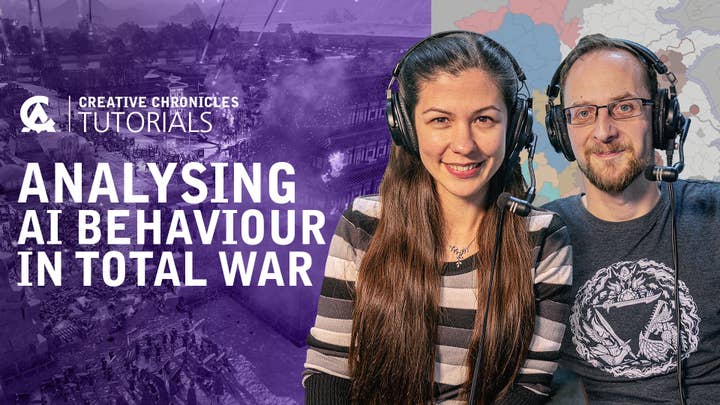Creative Chronicles: Analysing AI behaviour in Total War
The GI.biz Academy partners with Creative Assembly to publish its Creative Chronicles video series, today focusing on balancing AI behaviour
The GamesIndustry.biz Academy has partnered with Creative Assembly to publish its Creative Chronicles video series, tutorials on various aspects of game development. Previously covered topics include the challenges and opportunities of asymmetric design and character art in Total War: Warhammer. You can find all the videos on this page.
Today's talk gives insight into the challenges the Total War AI team face and what techniques they use when analysing and balancing AI behaviour in the turn-based mode of Total War games, focusing on Total War: Three Kingdoms.
We can summarise it briefly as a set of AI systems, each of them being responsible for making decisions in a different gameplay system. For example, we have a Finance system, Construction system, Diplomacy system, Task Management system, and the list goes on.
Each AI faction has its own personality which determines how that AI opponent makes decisions
Some of these systems are heavily linked to others, such as Finance affecting both Construction and Diplomacy, while some are completely isolated, such as Technologies. As the AI processes its turn, it goes through these systems in a specific order and makes decisions one by one.
This means that instead of thinking of all decisions for each gameplay system in one mass and trying to come up with the best one, while still considering everything in the universe, it fragments the problem. This makes it more manageable and means decisions are made in a matter of milliseconds instead of minutes or hours.
Usually this decision is made by assigning a score to the possible options and choosing the best one (or weighted and randomly picking from the top options). The method of assigning a score is like how any human player would evaluate a situation for example, when deciding who to ally with, considering diplomatic relations and faction strength.
When comparing AI factions, each has its own personality which determines how that AI opponent makes decisions in each AI system. We can define these AI personalities and the parameters of the various decision-making processes via a database, which makes it easier to tweak and experiment.
The complexity and depth of Total War: Three Kingdoms makes it difficult to have a clear picture on how well the AI is performing, how smart it is, where it's failing or whether the latest balancing changes have moved its behaviour in the right direction. With potentially 50 individual AI factions making decisions about every aspect of empire management, warfare and diplomacy, over hundreds of game rounds in a sandbox environment, this is not a small task. This is what Creative Assembly's Duygu Cakmak, senior AI programmer, and Csaba Toth, senior game designer, explore in this talk.
This is suitable for anyone with an interest in strategy game AI: students, professionals, programmers, designers and AI developers.
The GamesIndustry.biz Academy guides to making games cover a wide range of topics, from finding the right game engine to applying for Video Games Tax Relief, to crunch, to moving to live-service games and free-to-play. Have a browse.

